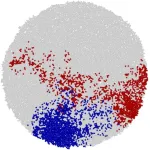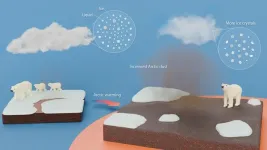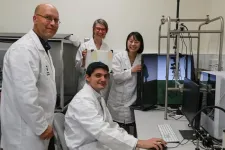(Press-News.org) Climate change is the single biggest threat to the global environment and socio-economic development – demanding an urgent transformation of the United Nations’ Sustainable Development Goals (SDGs), according to a new study.
The UN SDGs were created to end poverty, build social-economic-health protection and enhance education and job opportunities, while tackling climate change and providing environmental protection.
Following last week’s COP29 environmental summit in Baku, University of Birmingham experts say that, as climate action is linked to sustainable development, systematic integration of climate resilience into every aspect of the SDGs is the only way of securing our planet’s future.
Publishing their findings today (26 Nov) in npj Climate Action, the interdisciplinary team of researchers, from across all five of the University's constituent Colleges, sets out a blueprint for transforming the SDGs by integrating climate action across all targets and indicators.
The researchers emphasise the need for sustainable agricultural practices, water management, and ocean conservation to mitigate climate impacts, with climate-resilient tools and policies helping to ensure food security and protect natural resources. Their five-point plan involves the following recommendations:
Align the Paris Agreement’s climate objectives with the SDGs to create a unified pathway for sustainable development.
Define clear short-term targets alongside long-term goals to provide a structured approach for achieving climate-resilient development.
Empower local communities to help develop and implement climate-focussed policies.
Establish a unified financial system to support climate-resilient sustainable goals, particularly in vulnerable regions.
Form an international panel to allow coordination and knowledge exchange between sectors.
Corresponding author Professor Francis Pope commented: “Climate change is the most significant contemporary threat to the environment, human well-being, and livelihoods. It impacts every one of the 17 SDGs, particularly through increasing temperatures, rising sea levels, and extreme weather events.”
Lead author Dr Ajit Singh highlighted: “Embedding climate action within each SDG would ensure that climate resilience is a core component of sustainable development. If we fail to resolve tensions between development goals and climate action, we will find it impossible to secure the future of our planet and its people.”
The researchers note that climate change worsens poverty and inequality, as well as affecting health through disasters whilst influencing disease patterns and mental health. It reduces agricultural productivity and food security, whilst damaging water ecosystems and harming marine life.
They highlight the intricate links between climate change and poverty, health, education, and gender equality – calling for climate-resilient economic development and integration of climate education within school curricula to help communities to tackle climate challenges.
UN SDGs were developed through consultation with countries, international institutions and civil society. UN member states collectively agreed and formulated the global goals, but individual countries are responsible for reviewing and implementing progress towards SDG targets.
ENDS
For more information, interview requests, or an embargoed copy of the research paper, please contact Tony Moran, International Communications Manager, University of Birmingham, tel: +44 (0)7827 832312: email: t.moran@bham.ac.uk
Notes to editor:
The University of Birmingham is ranked amongst the world’s top 100 institutions. Its work brings people from across the world to Birmingham, including researchers, teachers and more than 8,000 international students from over 150 countries.
‘Delivering Sustainable Climate Action: Reframing the Sustainable Development Goals’ - Ajit Singh, Francis Pope, Jonathan Radcliffe, Carlo Lui, Hakeem Bakare, Suzanne Bartington, Nana O. Bonsu, John R. Bryson, Nic Cheeseman, Heather Flowe, Stefan Krause, Karen Newbigging, Fiona Nunan, Louise Reardon, Christopher D.F. Rogers, Karen Rowlingson, and Ian Thomson is published in npj Climate Action.
END
Transformation of UN SDGs only way forward for sustainable development
2024-11-26
ELSE PRESS RELEASES FROM THIS DATE:
New study reveals genetic drivers of early onset type 2 diabetes in South Asians
2024-11-26
UNDER STRICT EMBARGO UNTIL 10.00AM (UK TIME) ON 26 NOVEMBER 2024
New study reveals genetic drivers of early onset type 2 diabetes in South Asians
Peer reviewed | Observational study | People
A genetic predisposition to having lower insulin production and less healthy fat distribution are major causes of early-onset type 2 diabetes in British Asian people. According to new research from Queen Mary University of London, these genetic factors also lead to quicker development of health complications, earlier need for insulin treatment, and a weaker response ...
Delay and pay: Tipping point costs quadruple after waiting
2024-11-26
RICHLAND, Wash. —Tip the first tile in a line of dominoes and you’ll set off a chain reaction, one tile falling after another. Cross a tipping point in the climate system and, similarly, you might spark a cascading set of consequences like hastened warming, rising sea levels and increasingly extreme weather.
It turns out there’s more to weigh than catastrophic environmental change as tipping points draw near, though. Another point to consider, a new study reveals, is the cost of undoing the damage.
The cost of reversing the effects of climate change—restoring melted polar sea ice, for ...
Magnetic tornado is stirring up the haze at Jupiter's poles
2024-11-26
While Jupiter's Great Red Spot has been a constant feature of the planet for centuries, University of California, Berkeley, astronomers have discovered equally large spots at the planet's north and south poles that appear and disappear seemingly at random.
The Earth-size ovals, which are visible only at ultraviolet wavelengths, are embedded in layers of stratospheric haze that cap the planet's poles. The dark ovals, when seen, are almost always located just below the bright auroral zones at each ...
Cancers grow uniformly throughout their mass
2024-11-26
Researchers at the University of Cologne and the Centre for Genomic Regulation (CRG) in Barcelona have discovered that cancer grows uniformly throughout its mass, rather than at the outer edges. The work, published today in the journal eLIFE, challenges decades-old assumptions about how the disease grows and spreads.
“We challenge the idea that a tumour is a ‘two-speed’ entity with rapidly dividing cells on the surface and slower activity in the core. Instead, we show they are uniformly growing masses, where every region is equally active and has the potential ...
Researchers show complex relationship between Arctic warming and Arctic dust
2024-11-26
The Arctic is warming two to four times faster than the global average. A recent study by researchers in Japan found that dust from snow- and ice-free areas of the Arctic may be an important contributor to climate change in the region. The findings were published in the journal npj Climate and Atmospheric Science.
According to one view, higher temperatures in the Arctic are thought to lead to the region's clouds containing more liquid droplets and fewer ice crystals. Clouds become thicker, longer lasting, ...
Brain test shows that crabs process pain
2024-11-26
Researchers from the University of Gothenburg are the first to prove that painful stimuli are sent to the brain of shore crabs providing more evidence for pain in crustaceans. EEG style measurements show clear neural reactions in the crustacean's brain during mechanical or chemical stimulation.
In the search for a better welfare of animals that we humans kill for food, researchers at the University of Gothenburg have chosen to focus on decapod crustaceans. This includes shellfish delicacies such as prawns, lobsters, crabs and crayfish that we both catch wild and farm. Currently, ...
Social fish with low status are so stressed out it impacts their brains
2024-11-26
Social stress is bad for your brain. It’s a prime suspect in the accumulation of oxidative stress in the brain, which is believed to contribute to mental health and neurodegenerative disorders — but the mechanisms that turn social stress into oxidative stress, and how social status affects this, are poorly understood. By studying a highly social, very hierarchical fish species, cichlids, scientists have now found that social stress raises oxidative stress in the brains of low-status fish.
“We found that low rank was generally linked to higher levels of oxidative stress in the brain,” said Dr Peter Dijkstra of ...
Predicting the weather: New meteorology estimation method aids building efficiency
2024-11-26
Due to the growing reality of global warming and climate change, there is increasing uncertainty around meteorological conditions used in energy assessments of buildings. Existing methods for generating meteorological data do not adequately handle the interdependence of meteorological elements, such as solar radiation, air temperature, and absolute humidity, which are important for calculating energy usage and efficiency.
To address this challenge, a research team at Osaka Metropolitan University’s Graduate School of Human Life and Ecology—comprising Associate ...
Inside the ‘swat team’ – how insects react to virtual reality gaming
2024-11-26
Humans get a real buzz from the virtual world of gaming and augmented reality but now scientists have trialled the use of these new-age technologies on small animals, to test the reactions of tiny hoverflies and even crabs.
In a bid to comprehend the aerodynamic powers of flying insects and other little-understood animal behaviours, the Flinders University-led study is gaining new perspectives on how invertebrates respond to, interact with and navigate virtual ‘worlds’ created by advanced entertainment technology.
Published in the ...
Oil spill still contaminating sensitive Mauritius mangroves three years on
2024-11-26
Three years after bulk carrier MV Wakashio ran aground on a coral reef off Mauritius, spilling 1000 tonnes of a new type of marine fuel oil, Curtin University-led research has confirmed the oil is still present in an environmentally sensitive mangrove forest close to important Ramsar conservation sites.
Lead researcher Dr Alan Scarlett, from Curtin’s WA Organic and Isotope Geochemistry Centre in the School of Earth and Planetary Sciences, said the chemical ‘fingerprint’ of the oil found ...






